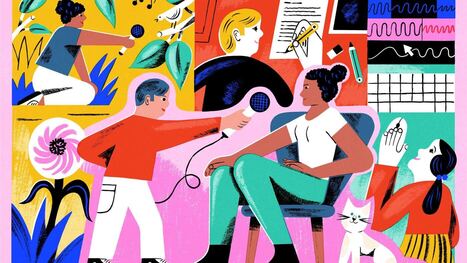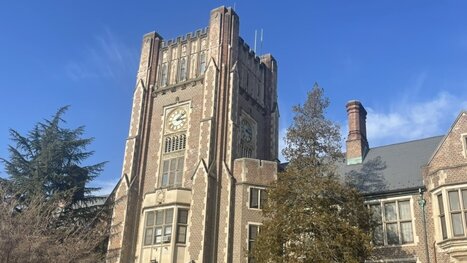 Your new post is loading...
 Your new post is loading...
The annual contest for students in grades four through 12 is back for its eighth year — this time with a special prize for a podcast that marks the 250th anniversary of the United States. To mark the 250th anniversary of the founding of the United States, send us podcasts that explore what the phrase, "life, liberty, and the pursuit of happiness" means to you. For this special challenge, our judges will be listening for stories that look back at historical events, take us to historic places, or that explore what it means to be an American. Stories of innovation, of rights and protest, arts and culture, civic engagement and governance, or personal narratives or beliefs.
The South Orange & Maplewood community in New Jersey has been through some very tough times. Schools superintendent Jason Bing says at least five young people enrolled at the public Columbia High School (CHS) have attempted to die by suicide this year. In December, one CHS student died in an accident; another young person, enrolled at a private school but known to many CHS students, died by suicide the same month. The School District of South Orange & Maplewood's most immediate response to this mental health crisis: it removed Junot Díaz's novel The Brief Wondrous Life of Oscar Wao from a high-level English class at CHS, which serves the suburban towns of South Orange & Maplewood about 15 miles west of New York City. After pushback from parents and students, the district said that parents could sign a permission form to allow their children to study the novel in class – a scenario which PEN America, the group dedicated to free expression, still classifies as a "book ban." The district also said it plans to implement an opt-in mental health screening for all CHS students, as well as shore up its current mental health offerings.
Researchers are examining whether a decline in reading and math scores over the last decade is related to the widespread use of smartphones by young people. Student test scores in the U.S. are down from where they were a decade ago. The trend is one that education researchers accept but took most of the decade to identify. Prior to the COVID-19 pandemic, "it was not yet obvious that there was a significant downward trend for most students," says Martin West, a professor at the Harvard Graduate School of Education. "[But] if you look at the data over the long term, it's very clear." West looks at a lot of student data, so when he started to see the decline, dating to the years after 2010, he and other researchers began searching for explanations.
WASHINGTON Feb, 27 2026 – A future where scientific research can be accelerated a hundredfold is coming, according to Darío Gil, undersecretary for science at the U.S. Department of Energy and leader of the Genesis Mission. At an appearance at the American Enterprise Institute on Tuesday, Gil outlined the promise and potential of the Genesis Mission, a project launched by Executive Order in November 2025. “For the first time ever we can imagine an internet of science,” said Gil. “What we're building with the Genesis mission [is] to install the world's most complex and capable scientific instrument."
Just a few years ago, historian and activist Ibram X. Kendi seemed to be everywhere. At the height of the Black Lives Matter movement, he became one of the leading voices on racism in America—and particularly what he described as antiracism. In 2019, his book How to Be an Antiracist became a bestseller. And later, just months after the death of George Floyd—a Black man killed by a white police officer in Minneapolis—Kendi founded the Center for Antiracist Research at Boston University, receiving $55 million in funding. But over the last few years, as a backlash grew against the BLM movement, Kendi also came under attack. His ideas urging people to be actively antiracist were often the target of conservative critics fighting against DEI policies and the teaching of critical race theory. Kendi was also accused of mismanaging the antiracism center at BU, which laid off much of its staff before closing last year. (BU cleared Kendi of financial mismanagement.) Kendi now leads another academic project, this time at Howard University’s Institute for Advanced Study, that focuses on racism and the global African diaspora. And next month, Kendi will release a new book called Chain of Ideas: The Origins of Our Authoritarian Age, which examines what’s known as the “great replacement theory” and its links to authoritarian regimes around the world.
Public universities are in a perception crisis. A 2025 Pew survey found 70% of Americans say higher education is heading in the wrong direction. But if your only interactions with universities are through the latest headlines you see, who can blame you? People are rightfully asking hard questions: What is the purpose of higher education? Where is the return on investment? What are students, taxpayers and communities getting in return? When was the last time my local university improved my life? These questions are opportunities, not threats.
With its twirly cord and landline-like features, the Tin Can is giving kids a crash course in phone etiquette. For example: Talk!
EdTech digitized the classroom and extended the reach of the university. It enabled hybrid learning, scaled access and modernized operations. But it was fundamentally application-centric. Value was trapped inside systems. Data sat in siloes. Interoperability was hard-won and often brittle. The architecture centralized not only control, but friction. That architecture is reaching its limits. In its place, we see the emergence of TechEd: a fluid, interoperable ecosystem powered by APIs, federated data, machine learning and natural language understanding. In TechEd, applications give way to platforms. Workflows give way to agents. Data becomes a river, not a lake. Most importantly, TechEd starts with the learner.
AI can transform how students learn — but it can be overwhelming for educators to master this new technology on top of their already demanding workloads. Existing AI training initiatives often require hours of time, and they don’t always clearly show how teachers can use what they’ve learned to help their students. We believe that for AI to be truly impactful in schools, educators need to lead the way. That’s why Google for Education is launching a landmark initiative with ISTE+ASCD to provide free, comprehensive Gemini training to all 6 million K-12 and higher education faculty in the U.S. It’s the largest initiative of its kind, designed to help these educators and their over 74 million students safely and thoughtfully use Google’s suite of AI tools - including Gemini and NotebookLM - to thrive in a world where AI is becoming more prevalent.
For seven years, she ran high-security nuclear simulations for the US government. Now, this famous supercomputer is being put to death. It was the government that decided it was time for Sierra to die. Sierra, it must be said, was a supercomputer, and so had never really been alive in the first place. But by any objective measure, she lived an impressive life. She resided in northern California at the Lawrence Livermore National Laboratory, where she was minded by dozens of staff at the lab’s computing complex, in Building 453. She completed her final jobs late last year, in October, before she went offline for good. She was 7 years old. According to the TOP500, which ranks these mega-machines, Sierra was once the second-fastest supercomputer in the world. She was conceived in a Chicago hotel conference room more than a decade ago, at a technical discussion for officials from America’s national labs. The ultimate designer baby, Sierra was assembled from thousands of IBM Power9 CPUs and Nvidia Volta V100 GPUs—a daring, offbeat architecture for Livermore at the time.
Jeffrey Epstein and Ghislaine Maxwell lavished money on the Interlochen Center for the Arts to gain access, documents show. In the process, two teenagers were pulled into their orbit.
NPR listeners share how they've made relationships with their neighbors and community. Many of them, through parties, potlucks and coffees, say they've made the first move. How did you build your village? We asked NPR's audience this question in our newsletter in January, inspired by Life Kit's interview with Priya Parker on how to create community. The key is to start imagining the community you might want to live in and then take steps to make that a reality, says Parker, a conflict resolution facilitator and the author of The Art of Gathering: How We Meet and Why It Matters Many of our readers have done just that. We received dozens of responses from folks who've found creative ways to make lasting connections where they live.
Keeping students off their devices is the new norm in many schools. We talked to students and educators at one Kentucky school to see how it's working. How do you get teenagers to put their phones away for hours at a time? That is the question many schools are trying to solve as bans on cellphones sweep the U.S. — more than 30 states so far now restrict their use during the school day. One of those states is Kentucky, where all public school classes must now be cellphone free. Districts can set their own policies to achieve that goal. Some collect phones at the start of each class; others allow students to have them only during their lunch period. The Jefferson County school district, which includes Louisville, set a "bell-to-bell" policy, opting to keep students phone free from the moment they walk in the building until they leave at the end of the day.
|
As marijuana use among teens has grown in the past decade, researchers have been trying to better understand the health risks of the drug. Now, a new longitudinal study finds that cannabis use among adolescents increases risks of being diagnosed with bipolar and psychotic disorders, as well as anxiety and depression, years later.
NEW YORK — Federal immigration authorities arrested a Columbia University student early Thursday, triggering protests on campus and allegations that agents gained entry to the university-owned residence by posing as police officers searching for a missing child. Just hours after detaining student Ellie Aghayeva, though, the federal government abruptly reversed course, permitting her to walk free after an apparent intervention by President Donald Trump. In a social media post Thursday afternoon, Mayor Zohran Mamdani said he expressed concerns about the arrest during an unrelated meeting with Trump, who then agreed to release her immediately. "I am safe and okay," Aghayeva wrote on Instagram, minutes after Mamdani's post, adding she was in "complete shock" from the experience.
More students than ever went to class without their cell phones in 2025. Researchers, teachers and students look back on attempts to build phone-free learning spaces this year. Thirty-two states have laws limiting personal devices during the day, with 20 of them passing laws this year. NPR's Sequoia Carrillo looks at how classrooms, hallways and cafeterias have changed.
First, Neanderthal males had lots more babies with human females than human males had with Neanderthal females. What’s up with that?! Then, strap in for a stellar swan song, antlers for breakfast, and a timeless style icon from the Cretaceous. A new genetic analysis reveals that human females and Neanderthal males interbred far more than the reverse, for reasons that remain mysterious.
The schools in Steubenville, Ohio, are doing something unusual—in fact, it’s almost unheard of. In a country where nearly 40 percent of fourth graders struggle to read at even a basic level, Steubenville has succeeded in teaching virtually all of its students to read well. According to data from the Educational Opportunity Project at Stanford University, Steubenville has routinely scored in the top 10 percent or better of schools nationwide for third-grade reading, sometimes scoring as high as the top 1 percent. In study after study for decades, researchers have found that districts serving low-income families almost always have lower test scores than districts in more affluent places. Yet Steubenville bucks that trend. “It was astonishing to me how amazing that elementary school was,” said Karin Chenoweth, who wrote about Steubenville in her book How It’s Being Done: Urgent Lessons From Unexpected Schools.
"Grasping at the Roots" is a film that is a love letter to the Black Environmental Justice movement This Documentary is a Beacon of Hope. As temperatures and tensions rise around us, Grasping at the Roots is a chance to follow some of the people who are making positive change in Black Environmental Justice communities. It is a window into the lives of those being hit by economic hardships, community disruptions, and climate change: living next to refineries and other industrial projects while bearing the brunt of a warming climate, and doing something about it. This 35 minute film is an opportunity to learn from people building solutions to the issues their communities face. Those who come from a long legacy of fighting for their lives and rights. This isn’t just a documentary. It’s a call to action.
Today, the importance of gaining AI literacy skills (in the age of AI) can’t be understated. However, other literacies are pre-requisites (see chart below). Reading and literacy skills in the U.S. are experiencing a significant, long-term decline, with 40% of fourth graders lacking basic reading skills — the lowest level in two decades — and a sharp rise in adult functional illiteracy. This crisis, accelerated by pandemic-era learning loss and increased screen time, impacts critical thinking, economic opportunity, and social mobility. This widespread decline in foundational literacy will likely contribute to media, digital and AI literacy skills deficit.
When Neanderthals and modern humans first got together, they preferred pairings between Neanderthal men and human women, a new study of ancient and modern genomes suggests. The finding helps to explain why modern humans (Homo sapiens) have a relatively low level of Neanderthal genes and why those genes are found in some populations today and not in others.
In 1871, Ku Klux Klan violence in South Carolina got so bad that the governor sent a telegram to President Ulysses S. Grant warning that he was facing a state of war. Grant sent him Amos Akerman: a former Confederate soldier and slaveholder who became the U.S. government’s most zealous warrior against the KKK. Guests: Bernard Powers, director of the Center for the Study of Slavery in Charleston at the College of Charleston in South Carolina Guy Gugliotta, author of "Grant's Enforcer, Taking Down the Klan" Kidada Williams, professor of history at Wayne State University and author of "I Saw Death Coming, A History of Terror and Survival in the War Against Reconstruction" To access bonus episodes and listen to Throughline sponsor-free, subscribe to Throughline+ via Apple Podcasts or at plus.npr.org/throughline.
The International Space Station is set to deorbit in 2030, and sociologist Paola Castaño-Rodriguez discusses whether private space station replacements can fill the scientific gap. When the International Space Station plunges to its fiery doom in 2030, its loss to science will be incalculable, even if it remains an open question as to whether its successes matched humanity's ambitions for it. By the time that the International Space Station (ISS) is safely and deliberately de-orbited over the Pacific Ocean, the station will have been permanently crewed for 30 years — it has had visitors ever since the first Expedition 1 mission (consisting of one astronaut and two cosmonauts) first docked with the fledgling, half-built station on November 2, 2000. Yet as we begin to near the end of the ISS's time in low Earth orbit, we are beginning to think ever more about the station's true legacy, whether it achieved what it set out to achieve, and what we will lose when it is finally gone. The loss of the ISS will be keenly felt by many; it will be like when one of our beloved Mars rovers falters and is forced to end its mission. Sure, there will be other Mars rovers after, but they will be different. There will be other space stations, but they will be different. For some, though, says sociologist Paola Castaño-Rodriguez of the University of Exeter, the end of the ISS will be no loss at all, as they always saw it as a white elephant.
Dozens of juvenile detention centers in 25 states reported holding children weeks or months as they awaited space at long-term psychiatric treatment facilities, according to a new survey. "Prolonged Incarceration of Children Due to Mental Health Care Shortages," released Thursday by the staff of Democratic Sen. Jon Ossoff and Republican Rep. Jen Kiggans, is based on a survey sent to administrators of public juvenile detention facilities around the country. About half of those who responded to the survey reported they had, at some point, kept children incarcerated when they could have been released into offsite mental health care. "This should shock America's conscience," Ossoff says. "Children with special needs, locked up for extended time instead of getting the mental health care that they need."
|



 Your new post is loading...
Your new post is loading...




























